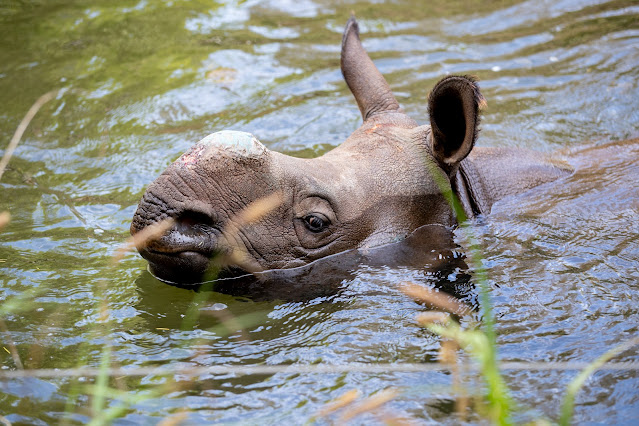Posted by Gigi Allianic, Communications
Photos by Woodland Park Zoo
Woodland Park Zoo’s population of two male greater one-horned rhinos will soon change. Taj is scheduled to move in a couple of weeks to El Paso Zoo in El Paso, Texas.
 |
| Taj tasting a leafy offering in 2018. |
The rhinos were born a day apart from each other and turned 7 in November. Taj currently weighs a whopping 4,670 pounds and Glenn 4,135 pounds.
Taj and Glenn represent the only rhinos who have lived at Woodland Park Zoo in its nearly 125-year history. The boys arrived at the zoo at 18 months old and made their public debut in 2018 in the new Assam Rhino Reserve. They immediately became popular to visitors, marking the first time for many to encounter rhinos in person.
Zoo members, visitors, and social media fans have watched Taj and Glenn grow and thrive together, learned about these iconic symbols of wildlife trafficking, and witnessed natural rhino behavior such as the pair wallowing in mud baths, play sparring, dipping in the pool and running zoomies throughout the yards.
 |
| Taj means “crown” or “jewel” in Hindi. |
“We’re so grateful Taj and Glenn have compatibly shared the same space for more than five years,” said Erin Sullivan, an animal curator at Woodland Park Zoo. “After Taj leaves, the rhino keepers will focus on spending extra social time with Glenn, such as scratch downs and training. A variety of new, fun toys will be offered to encourage natural behaviors including testing out his horn and play sparring, which are social behaviors the boys have engaged in while living together.”
Glenn may have a positive reaction to the departure of his long-time friend because mature males naturally want to lead a solitary life, explained Sullivan. “Without Taj at the zoo, Glenn will be in charge of his home range which will no longer overlap,” added Sullivan.
Rhino keeper Al Kennedy, who has cared for the zoo’s rhinos for several years, shares that Taj is attentive, steady and patient. “Taj likes seeking snacks and scratches from the rhino keepers and loves swimming, soaking and hot showers during cold temperatures. Taj is calm, cautious and steady and, while he doesn’t often initiate, he will gladly engage in playing,” said Kennedy.
Once medical testing is complete and the receiving veterinarian approves, Taj will travel to El Paso in a specially outfitted crate in a climate-controlled truck driven by an expert who specializes in moving large animals. Animal care staff are currently conducting crate training sessions using positive reinforcement techniques.
A Woodland Park Zoo curator and a rhino keeper will follow in a chase vehicle along the ~1,700-mile road trip. Taj will be checked after he’s offloaded at El Paso Zoo and the keeper will stay a few days to help Taj settle in.
 |
| Taj (on right) and Glenn (in the background) |
Taj and Glenn arrived at Woodland Park Zoo from San Diego Zoo Safari Park and Columbus Zoo and Aquarium’s The Wilds, respectively. Their move was recommended by the Species Survival Plan for greater one-horned rhinos. Woodland Park Zoo made a commitment to take on a supporting role by providing a home for these young males who were not ready to start families or live as solo bachelors at that time.
 |
| Taj enjoying his browse |
Once found across the entire northern part of the Indian subcontinent, the population rapidly declined to fewer than 200 in the 20th century due to sport hunting, human conflict, poaching for their horns for use in traditional medicine and habitat loss. Woodland Park Zoo partners with the International Rhino Foundation, a conservation organization operating on-the-ground programs in Africa and Asia that support viable populations of the five remaining rhino species and the communities that coexist with them.
 |
| Taj taking a dip! 2018 |
To learn how to help protect rhinos, visit #RhinoLookout. Also explore adopting a rhino by becoming a ZooParent; the program supports the zoo's animal care, education, and wildlife conservation in the Pacific Northwest and around the world.
Assam Rhino Reserve was made possible by private donations of all sizes from generous individuals, families, corporations and foundations through the zoo’s $110M Forests for All campaign, as well as funding from the Seattle Park District.

Comments
Post a Comment